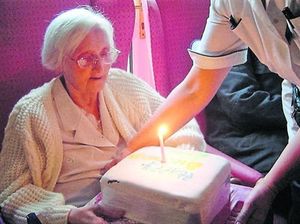Most will have noticed that there are now a lot more old people in our congregations. But have we realised just how much the age profile of society is changing?
In the last hundred years the average life expectancy in Britain has risen from fifty to eighty years. Fifty years ago, 60% of the population were under twenty years of age. Soon 50% of the population of Britain will be over fifty. Currently, 20% of the population is over sixty, but by 2010 this will rise to 25%, and will rise again to 33% by 2025. By 2030 there will be fourteen million people over sixty-five, compared to nine million now.
This must mean that the make-up of congregations is changing. We should not be surprised if over 20% of a given congregation is made up of people over seventy, and many of those over eighty. Despite this, many churches are dominated by a youth culture, and neglect the needs of ageing believers.
Threat or opportunity?
There is no shortage of debate about the implications of an ageing society generally, but the Evangelical church has been strangely silent on the subject. What are the implications for pastoral oversight, for meeting the needs of older believers, and for inter-generation relationships within churches where age differences can span almost a century?
Christians have always done much to meet the needs of believers who require special care, including the elderly. Societies like Pilgrim Homes saw the need to provide for believers who became frail and lacked family and carer support. Their contribution must not be underestimated.
However, there is a danger that our concern becomes focused on people who have significant health and social-care needs. The reality is that 85% of older people do not have such problems. But they do have other needs!

Negative thinking
The focus on health and social care for older people has produced negative thinking about age. Old age is often seen as a problem. Can Britain afford to pay for the care of an increasing older population? Who will care for growing numbers of old people? A society with a large proportion of retired people is seen as having special problems.
But this is wrong thinking. The Bible rarely speaks about old age in negative terms. The Psalmist declares: ‘They shall still bear fruit in old age; they shall be fresh and flourishing’ (Psalm 92:14). Wisdom is a product of many years. Old age is the period when we get increasingly close to that which is ‘far better’, and live more immediately in expectation of our certain hope.
In a society where many people feel written off at fifty, especially if that coincides with premature retirement or job loss, the Bible presents a message of increasing usefulness and value. Ironically, many Christians feel that retirement from secular employment can mean retirement from spiritual usefulness, when the opposite should be true. Remember the experience of the rich farmer who thought that early retirement was about a life of ease and pleasure, eating and drinking and being merry?
What older people want
Older people have specific pastoral needs, which we must learn to address. There has been a lot of research recently to find out what older people want, and this has some relevance to church life. Seven main themes have emerged.
Firstly, there is the desire to be seen as a person. Older people have their own characters, interests and needs. They do not want to be seen just as ‘one of the old folk’. They expect their dignity to be respected and to be treated as equals, not talked down to.
Secondly, they want friendship, relationships and, yes, even fun. God created men and women as social beings. Man’s chief end is to glorify God and to enjoy his friendship. We also enjoy friendship with others.

When husbands, wives, family and friends die, it can create a real sense of loneliness. There is some evidence that good mental health depends on a minimum of five or six social contacts a day. How aware are we of how much contact our older people have, especially those who live alone and cannot get out and about? This does not require lots of personal visits; regular contact by telephone can help greatly.
Thirdly, they want to continue with their normal patterns of life. Old age can be disabling when it need not be. For example, an old person who has had a fall may be told to sit down all day long because their families do not want the risk of them falling again. Some are put into residential care because they have become forgetful. Perhaps they left the gas on, or left the house insecure, or something else that has worried their families.
But older people want to go on doing normal things for as long as they can. They want to shop, cook, clean, participate in church activities, and be givers rather than receivers, for as long as they can. If we decide that it is all too risky, we disable them, rather than help them give what they still have to offer.
Fourthly, they need to get out and about. Why do so many churches hold services in local residential and nursing homes? Have we really thought how we would feel if everything came to our homes (whether we wanted it or not) and we ourselves never went out?
Most people in care-homes can still get out and about, given help with transport. Of course, this means that our church buildings have to be made accessible to those with disabilities and frailties. But if we are to be socially inclusive, we should be doing this anyway. Those with cars should use them in God’s service. This can be as simple as bringing older people to church, or taking them out to places they want to visit.

Feeling safe
Fifthly, they need to feel, and be, safe. Most accidents happen in the home. Older people may fall when trying to reach objects on high shelves, or when changing light bulbs. Some accidents could be prevented by fitting simple handrails. Do we show love for one another in practical ways? Do older people in your church feel able to phone other believers to come and change a light bulb, or do simple maintenance work?
Dark nights also create fears for older people. Do we think of their needs when we plan the times of our meetings? Do we make a point of offering to escort people to their own homes, even if they live nearby?
Staying healthy
Sixthly, they need to feel, and to be, as healthy as possible. Do increasing years just bring longer lives dogged by physical and mentally disability? Or have advances in medical science meant that older people are now dying healthy? The debate is yet to be concluded on this point, but behind it is the reality that older people are just like everybody else — they want to feel healthy and well.
As Christians we should add an extra dimension here. Older believers also want to remain spiritually active. When preachers are applying God’s Word, do they consider the role of older believers? Young people are catered for by having their own meetings. So older people can also benefit from gathering separately, as long as this provision is handled sensitively.

Staying in control
The seventh point is that old people need to be in control of what happens to them. We know that God is sovereign and that he is in control of all things, and this makes us glad. But, within this benign sovereignty, we have to exercise our personal responsibility and accountability.
As people get older, and become more dependent, there is a tendency for others to ‘take over’ their lives. For example, they may prefer to be given time and space to find their own way to their seats at church, rather than being guided and directed by others. This calls for sensitivity, since many older people feel unable to decline imposed help.
Responding to the challengeThere are a number of steps we can take to respond in a positive way to the problem of ageing. First of all, we should avoid the social exclusion of the elderly. Buildings should be accessible to those with mobility problems. Internal design should help those with sight impairments, and technology should be utilised to help those with hearing difficulties.
Car-owning Christians should be encouraged to use their vehicles for the benefit of older people in the congregation. At a time when the cry goes out for preaching that will benefit young people, we should remember that older people now outnumber the young, and that they need the gospel and sound teaching as much as anyone.
Secondly, we must value the contribution of old people to the life of the church. In today’s busy world, who has the time to keep in touch with older people? Often the task falls on busy pastors or others already active in church life. This fails to recognise the enormous contribution that the younger ‘golden age’ people can make.

In our own church, one of the most helpful people is a lady in her late seventies who has major mobility and sight difficulties. In spite of these handicaps, she spends hours every day phoning older people to check on their well-being, and alerting others if they need help. The busier such ‘younger-older’ people become in Christian service, the less likely they are to develop the negative features of ageing.
A view of eternity
A third step we can take is to be practical. Set up systems so that those who can do emergency repairs, or give short periods of care, can be contacted without inhibition. This approach has benefits far wider than just to elderly believers. What a way to show the reality of the gospel to older people in our local communities!
Finally, keep a clear view on eternity. The current debate about age is mainly set in a secular context. Yet increasing years simply extend a transient pilgrimage. Even with extended lifetimes, this world is not our home. Our teaching and our living need to reflect this truth.
Longer years increase our accountability to God for the way we have used our time. May our testimony be that described by the psalmist: ‘They will still bear fruit in old age, they will stay fresh and flourishing, to declare that the LORD is upright; he is my Rock, and there is no unrighteousness in him’ (Psalm 92:14).









